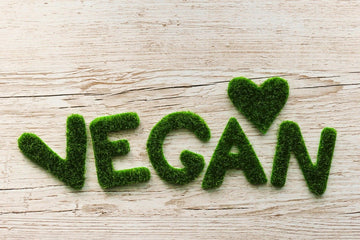How did World Vegan Day come about?
World Vegan Day has its roots in England and was founded in 1994 by animal rights activist and vegan Louise Wallis. On the occasion of the 50th anniversary of the Vegan Society, Wallis, then president, was looking for a way to honor the existence of the vegan movement and to anchor the word "vegan" more firmly in people's consciousness. She chose November 1st as the date - a symbolic day between Halloween and the Mexican "Day of the Dead."
Today, World Vegan Day is celebrated worldwide and offers the opportunity to highlight the vegan lifestyle and inform people about the ethical, ecological and health benefits. This day is not only intended to bring like-minded people together, but also to inspire people to do their part to protect animals and the environment - in the spirit of Gandhi: "Be the change you wish to see in the world." (1)
Vegan lifestyle – just a short-term trend?
The vegan lifestyle is becoming increasingly popular worldwide, and this trend is also reflected in the numbers. In Germany, for example, around 2% of the population, or 1.52 million people, are now vegan (2.3), and this proportion is growing steadily. People who are increasingly committed to issues such as climate protection and animal welfare are particularly likely to choose a vegan lifestyle. Health or alternatives for food intolerances are also a priority. (2) The number of vegans worldwide is also increasing: 500 million people are vegan, the majority of them in Asia. In Europe, an average of 2.1% of vegans per country live - Ireland, Denmark, Norway and Sweden have the highest proportion at 4%. In the USA, for example, the number of vegans increased significantly from 3% (2020) to 5% (2022). (3)
The “World Vegan Day” on November 1st is therefore a wonderful opportunity to inform people about the many reasons for a vegan diet and to inspire more people to adopt this lifestyle.
Why vegan?
The decision to adopt a vegan diet is often made for ethical, environmental and health reasons (2):
- Ethical reasons : Many people reject industrial animal farming and therefore decide against consuming animal products. Animals should be able to live a life free from suffering, which is something that is very important to many vegans.
-
- Environmental aspects : Animal husbandry is one of the main causes of greenhouse gas emissions and requires large amounts of water, land and energy. A plant-based diet, on the other hand, has a much lower environmental impact and contributes to climate protection. According to the position paper of the German Nutrition Society (DGE) on vegan nutrition, a vegan lifestyle can reduce greenhouse gas emissions by 69 - 81 percent. (4)
-
- Health aspects : Studies suggest that a vegan diet can reduce the risk of cardiovascular disease, certain types of cancer and diabetes. The focus on fruits and vegetables, nuts and whole grains in a plant-based diet appears to be crucial for this. (5)
Benefits of a vegan diet
The vegan diet offers many benefits for health and general well-being:
- Better heart health : Vegans tend to have lower BMI, total and LDL cholesterol levels, and blood pressure compared to other diets. The lower BMI and higher intake of fruits, vegetables, whole grains, soy, and nuts, which contain heart-protective nutrients, help protect against cardiovascular disease. (5)
-
- Cancer prevention : Studies such as the Adventist Health Study show that vegetarians, especially vegans, have a lower risk of certain cancers such as colon and prostate cancer, due to lower BMI and higher consumption of cancer-preventing foods such as legumes, fruits, vegetables and soy products. Phytochemicals in plant foods have antioxidant and cancer-protective effects, although factors such as preparation and bioavailability may have an influence. (5)
-
- Weight management : A study showed that the body mass index (BMI) of fish eaters, vegetarians, meat eaters and vegans was lowest in the vegan diet. (6) Therefore, weight management appears to be easier with a vegan diet than with other diets.
What should vegans pay particular attention to
Although a vegan diet offers many benefits, it is important to pay special attention to certain nutrients to ensure a balanced nutritional supply:
- Vitamin B12 : Since B12 is found almost exclusively in animal products, it is recommended to take this vitamin via dietary supplements, as deficiency symptoms only appear much later. (4)
-
- Iodine : Adequate iodine intake is also necessary in a vegan diet, for example through the use of iodized table salt. (4)
-
- Protein, long-chain n-3 fatty acids, vitamin D, riboflavin, calcium, iron, zinc, selenium and possibly vitamin A: Since these vitamins and nutrients come primarily from animal foods, emphasis should be placed on a targeted selection of plant-based foods, primarily fruit, vegetables, legumes, nuts and whole grain products. (4,5)
-
- α-linolenic acid Oils with a high linoleic acid content: According to the DGE, it makes sense to include these oils in a vegan diet. The acid is found, for example, in rapeseed and walnut oil as well as germ oils and sunflower oil. (4)
-
- Vulnerable groups such as children, pregnant women and breastfeeding women : The DGE recommends supplementing essential nutrients such as B12, iron and iodine, adapted to the respective needs, as well as seeking advice from nutritionists and specialists. (4)
Conclusion
World Vegan Day reminds us of the many different reasons for adopting a vegan diet and the positive effects it can have on health, the environment and animal welfare. A vegan diet offers many opportunities, but also brings challenges that can easily be overcome with targeted planning. Whether for the environment, health or ethics - adopting a vegan lifestyle can be a conscious and enriching decision that offers both personal benefits and contributes to a sustainable lifestyle.
Sources:
- (1) World Vegan Day, available at: https://vegan-day.org/de/ [30.10.2024].
- (2) Nutrition Report 2024: This is what the Germans eat, available at: https://www.deutschland.de/de/topic/leben/ernaehrungsreport-2024-das-essen-die-deutschen#:~:text=Vegetarische%20oder%20vegane%20Alternativen%20zu%20Fleisch%20werden%20in,Prozent%20ern%C3%A4hren%20sich%20vegetarian%20and%20two%20percent%20vegan. [30.10.2024].
- (3) Veganivore: Number of vegans in Germany – 140+ facts (2024), available at https://veganivore.de/anzahl-veganer-statistiken-fakten. [30.10.2024].
- (4) Klug, A., Barbaresko, J., Alexy, U., Kühn, T., Kroke, A., Lotze-Campen, H., ... & Watzl, B. (2024). Reassessment of the DGE position on vegan nutrition - position paper of the German Nutrition Society (DGE). Nutritional Review International , 71 (7), 60-84.
- (5) Craig, W.J. (2009). Health effects of vegan diets. The American journal of clinical nutrition , 89 (5), 1627S-1633S.
- (6) Spencer, EA, Appleby, PN, Davey, GK, & Key, TJ (2003). Diet and body mass index in 38 000 EPIC-Oxford meat-eaters, fish-eaters, vegetarians and vegans. International journal of obesity , 27 (6), 728-734.


























